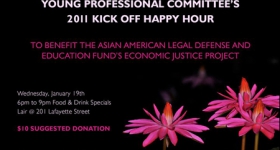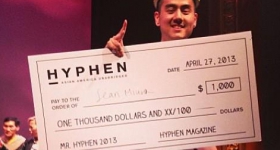"One-Way or Round Trip? Immigrant Arrival and Return" focused on the intersection between personal migration stories, diasporic identity, and immigration policy. Kavitha Rajagopalan read from Muslims of Metropolis, which takes an intimate look at three families' immigration experiences, while Mae Ngai (Impossible Subjects) tied unauthorized entry to macro factors such as the US' broken immigration system and the policy reforms needed to address immigration in a humane and practical way.
Mitra Kalita read from her book Suburban Sahibs, about her decision to move her family from New York to India, only to return after discovering she felt even more of an outsider in India than she did in America. Professor Firoozeh Kashani-Sabet (Frontier Fictions) discussed the growth of the Iranian American community, and how the decision to stay is not only due to political factors, but perhaps a sense of not quite belonging in contemporary Iran. I found that the dialogue among speakers approaching immigration from varied disciplines was an effective and interesting way to link the personal to political (and back again) in framing this pressing policy issue.
Jen Kwok serenaded us with a ukelele'd rendition of "Date an Asian", as well as the first song she ever wrote, about the difficulties of being a sassy fat girl stuck in a skinny Asian girl's body. Ed Lin read several short pieces recounting his childhood hatred of playing clarinet and getting cursed out by his exacting, uptight music teacher. Lin then channeled his mom to tell a ghost story, which turned out to just be her describing the anxiety she experienced while watching The Ring.
The speakers then discussed issues of being looked to as an "authentic" Asian American voice -- whether from white readers or their own communities -- and how their "eclectic style" was sometimes met with resistance or confusion. Ironically, a white lady in the audience made the comment that she was surprised by the panelists' humor and even (gasp!) vulgarity, and found that Asian American writing was not usually like that...was this a trend in Asian American literature? After some palpable squirming and cringing in the audience (I was hoping for a bellowing AW HELL NAW from the back), Porochista Khakpour replied: "People of color are funny and vulgar and raw just like other people," to which Sesshu Foster added: "There's a trend in mainstream culture of boring and staid literature, and I don't want to be that." Boom! And that's real talk!
The last panel I attended, "Beyond Harold and Kumar: Representation in a Not-Yet-Post-Racial-Era", was packed with folks to see playwright David Henry Hwang, CUNY Director of Asian American Studies Jennifer Hayashida, and Columbia School of Journalism Dean of Student Affairs Sree Sreenivasan, discussing the invisibility/visibility of Asian America in everyday American culture. Hwang read an excerpt from Yellowface, and Sreenivasan described his obsession with "Desi-spotting", and how it embarasses his kids, who consider themselves American as opposed to Indian.
While the well-worn issue of the generational gap came up, the discussion interestingly turned to the role of new blogs and social media in reclaiming Asian American identity. Hayashida felt that sites like My Mom Is A Fob, Stuff Indians Like, and Disgrasian are able to re-write racial constructs and re-claim pride in Asian American idiosyncracies in a way that may have been frowned upon by our activist predecessors. Everyone seemed in agreement that "post-racial" is a unhelpful and meaningless attempt at solidarity (with similar pitfalls as the "colorblind" argument), and moving beyond "Otherness" requires proactively talking more -- not less -- about race, class, and all the things that make up our differing and multiple identities.
Overall, the Page Turner Festival made clear that Asian American writers are no longer relegated to being racial ambassadors or bridges between the mainstream and ethnic. While sometimes overshadowed by the Amy Tans and Maxine Hong Kingstons (at least in mainstream lit), there is no dearth of powerful, raw, hilarious, touching and everything-in-between Asian American literature, which must be supported so we can continue to have a strong community of writers that voice the complexity of Asian America.










Comments